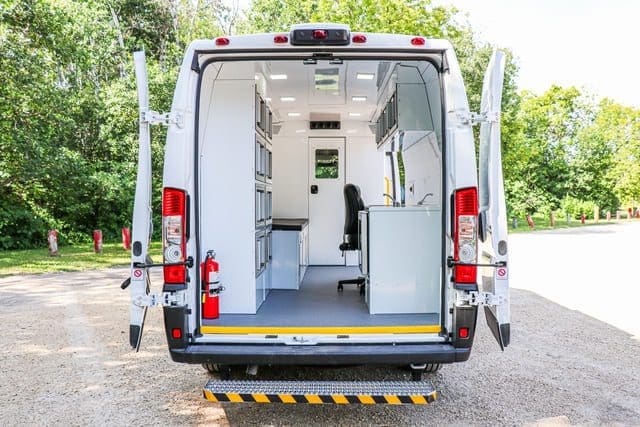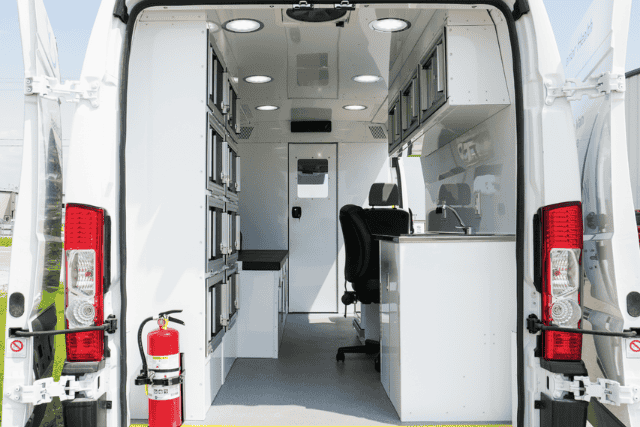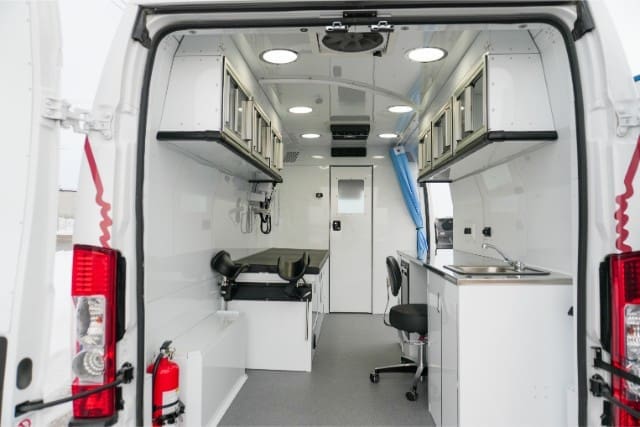Running a successful behavioral health program can be tough. One challenge is reaching people in remote areas where transportation and healthcare are not easy to come by. Another problem is the cost of having a physical building for the program, especially for new ones.
That’s where a mobile clinic can come in handy. It’s like a traveling health center that can bring your program to these remote areas. This way, more people can get the help they need without the added burden of going to a fixed location. So, a mobile clinic helps overcome these difficulties and improve the program.
At AVAN Mobility, we’re aware of these hurdles, and that’s why we build mobile clinic vans to reduce these types of barriers. Our engineering and manufacturing processes allow us to create tailored solutions for all of our clients. Some of the solutions include:
- Building mobile clinic vans that can travel to remote areas
- Providing easier access to behavioral health services through these vans
- Reducing the need for people to find transportation to a fixed location
- Offering customized mobile clinic solutions for different clients’ needs
In this article, you’ll learn more about how a mobile clinic can help your behavioral health program. We’ll talk about the challenges you might be facing, the benefits of using a mobile clinic for your program, and some considerations to keep in mind.
What is a mobile clinic?
A mobile clinic is like a doctor’s office on wheels. It’s a specialized vehicle that brings medical care to people who can’t easily go to a regular hospital or clinic. Mobile clinics are extremely helpful, especially for those living in remote areas or places without easy access to healthcare.
Who can use a mobile clinic?
Mobile clinics are for everyone, especially for those who find it hard to reach a regular hospital or clinic. Here are some reasons people might use a mobile clinic:
- People living in rural areas
- Families with no cars or transportation
- Schools that want to offer healthcare services to students
- Homeless people who need healthcare support
- Anyone else who needs healthcare but can’t easily get to a hospital or clinic
Challenges of a behavioral health program
Starting a behavioral health program without a mobile clinic can be hard. Typical challenges solved by using a mobile health van include:
Hard to reach people: Without a mobile clinic, It’s tough to help people with behavioral concerns who live far away or can’t come to where you have a physical location. For example, the homeless population who have physical or mental health issues would have difficulty reaching a physical location without transportation.
Lack of flexibility: Without a mobile clinic, it’s not easy to go where help is needed right away or change your plans quickly. You’re limited to one fixed location and people have to come to you. In addition, you’re stuck with all of your resources in that one location and unable to reach people who need help the most.
Reduced community presence: If you don’t have a mobile clinic, it could take time for people to know about your program and trust it. With a mobile clinic, you’re constantly driving around and people will know that your organization exists.
Lots of planning: Running a fixed location needs a lot of planning and budgeting. It involves higher costs and sometimes partnering with existing healthcare facilities to make things work.
Crisis response: When someone is going through a behavioral crisis, having one fixed location isn’t ideal, especially if they can’t get to it.
How can a mobile clinic help with behavioral health?
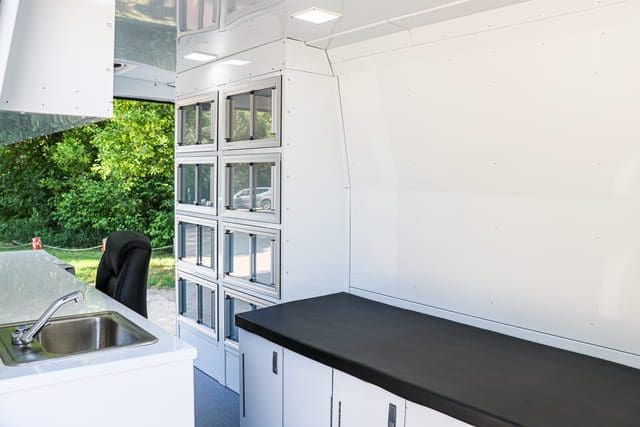
A mobile clinic for a behavioral health program can offer many advantages:
Bringing care to you
Imagine you live in a small neighborhood, and sometimes it’s hard for you or your family to go to a clinic. Maybe you don’t have a car, or maybe there’s no clinic close by. This is where the mobile clinic comes to the rescue. Walking inside a mobile clinic feels like a comfortable doctor’s office, but just on wheels.
The staff will be friendly and welcoming, ready to listen to your feelings and concerns. You can talk to them about anything bothering you, like feeling sad, anxious, or stressed. They understand that our minds and feelings are important, just like our bodies, and they’re there to support you. They can offer guidance and coping strategies.
Your helping hand
Anyone in the community can visit your mobile clinic, including kids, adults, and older folks. It’s a safe space for all.
Embracing compassion, breaking stigma
Some people might feel embarrassed or worried about going to a regular clinic for behavioral health. The mobile clinic is more private and can help reduce the fear of judgment.
Catching issues early
Your mobile clinic can spot behavioral health issues early, helping prevent them from getting worse. Early help can lead to better outcomes. Catching behavioral concerns early can be thought of as stopping a tiny snowball from rolling down a hill and becoming a bigger one.
Building knowledge together
Your mobile clinic team can teach people in the community about behavioral health and spread awareness about it. When your mobile clinic parks in a neighborhood, it’ll gain the attention of other people around it. This is a chance for the community to learn about your behavioral health program and grow together. You can hold special events and workshops where everyone can join in, including kids, adults, and grandparents alike.
Easy access to all
Your mobile clinic can visit different places at different times, making it easier for more people to get help with their behavioral health needs. It’s much more flexible than a fixed clinic.
Building trust
Your mobile clinic will build trust in the community as it shows that behavioral health is important and that help is available.
Connecting with other services
The mobile clinic team can connect you with other resources and services that can provide additional support.
Things to consider with a mobile clinic for your behavioral health program
Thinking about starting a behavioral health program with a mobile clinic? Here are a couple of things to consider while you’re deciding.
Money matters: Running a mobile clinic can be expensive. You need to plan and budget for the vehicle, equipment, and staff.
Staffing: You need caring and qualified people who know how to handle behavioral health issues across diverse populations.
Versatility: A mobile clinic offers flexibility, but you’ll need to plan your schedules carefully to maximize its impact. Consider the best locations and times to visit communities to reach your target audience.
Equipment: Your mobile clinic should have the tools and supplies to provide your services. This might include therapy materials, assessment tools, and medication if required.
Safety first: Keep everyone safe with plans for emergencies and risks. Encourage open communication to address any safety issues promptly.
Patient privacy: Patient confidentiality and privacy are important in any behavioral health setting, including a mobile clinic. Make sure that patient information is securely stored and accessible only to authorized personnel.
What’s next?
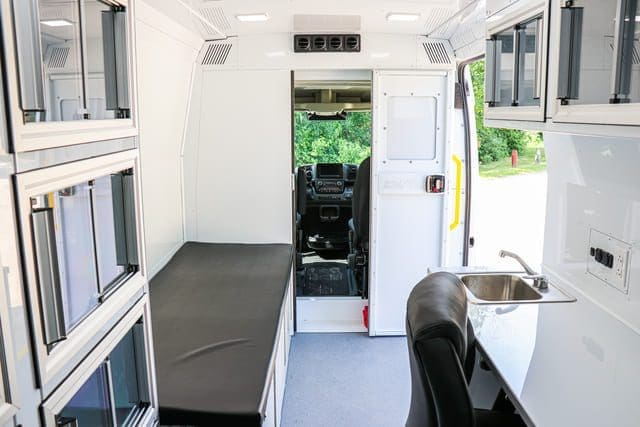
You landed on this article wondering how a mobile clinic can help with your behavioral health program.
You learned that a mobile clinic can be a valuable tool for addressing the challenges faced by behavioral health programs. Additionally, you also learned about the importance of careful planning, budgeting, and qualified staff when considering the implementation of a mobile clinic.
At AVAN Mobility, we work with you to customize mobile clinic vans exactly how you’d like. If you need any more information, talk to an expert today.
Or, take a skim through some of our other helpful articles for more information.
